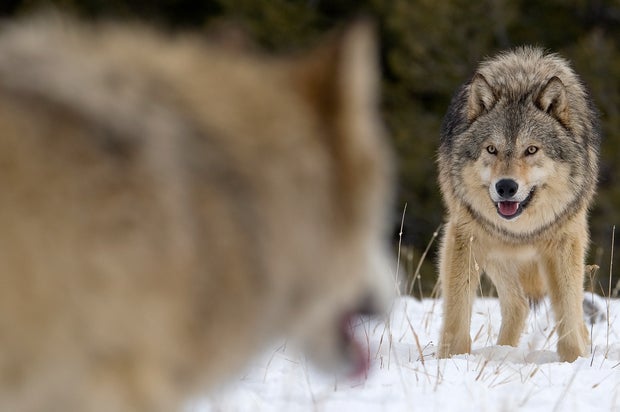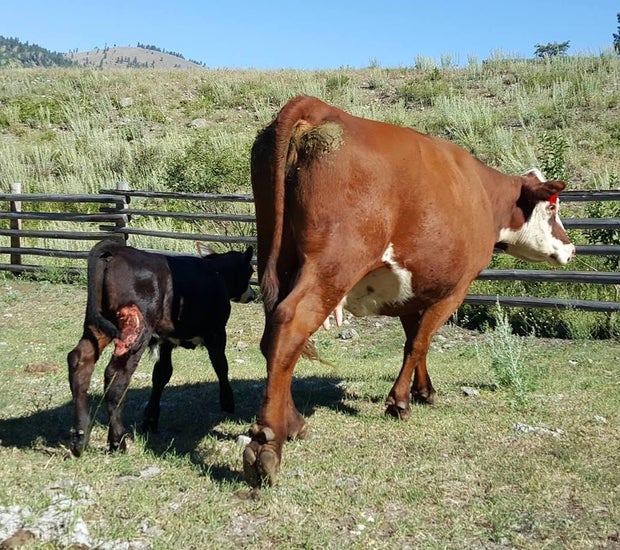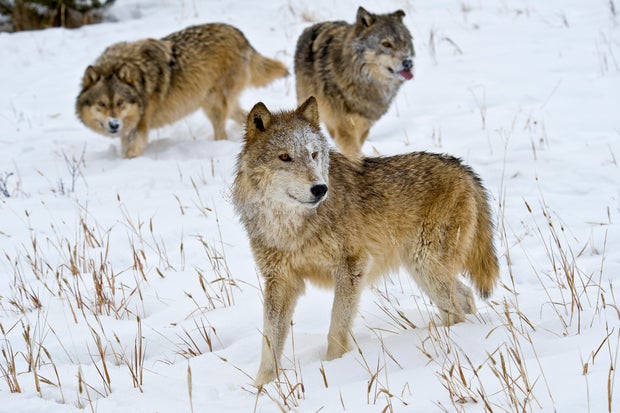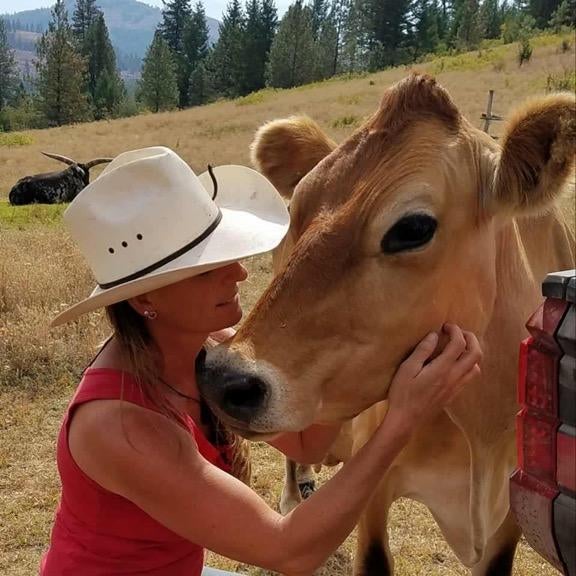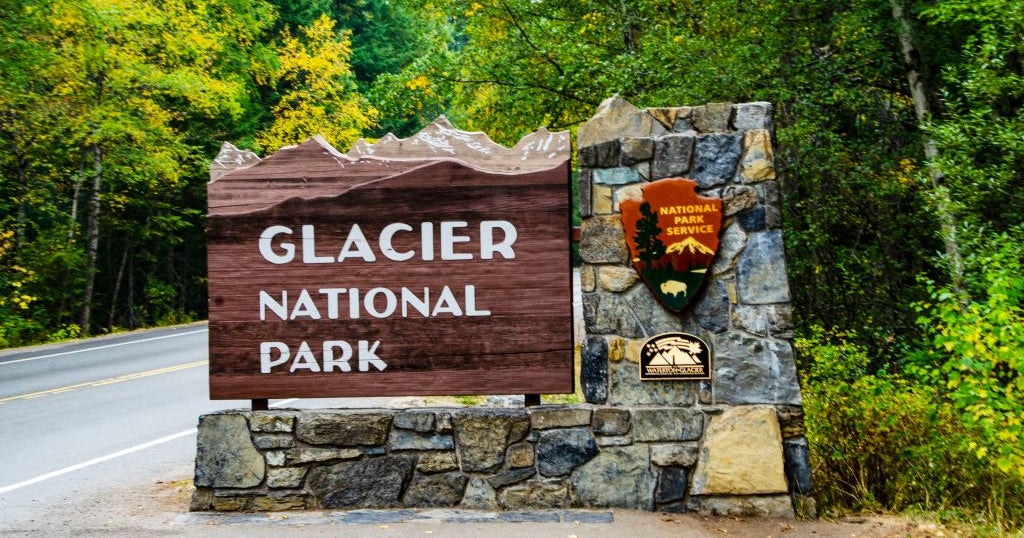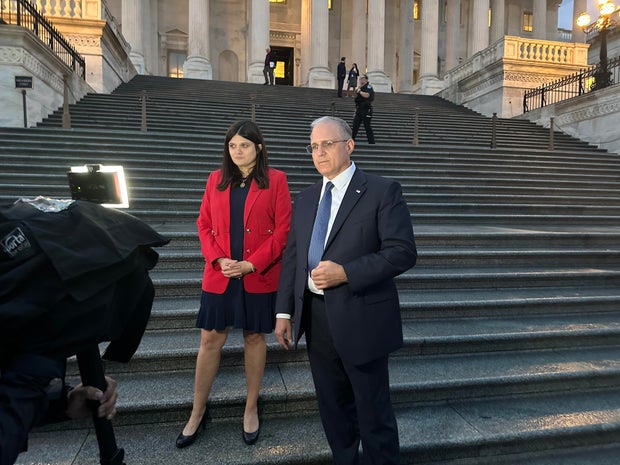CBS News
As gray wolves divide conservationists and ranchers, a mediator tries to tame all sides

When Francine Madden heard about a Wyoming man who killed a gray wolf after injuring it with his snowmobile and showing it off at his local bar, she was disturbed, but not very surprised.
She’s seen a lot during her almost three decades working as a mediator for wildlife conflict. She’s resolved disputes over gorillas in Uganda and tigers in Bhutan, but for 50-odd years, the management of gray wolves has been an intractable American problem.
Dennis Fast / VWPics/Universal Images Group via Getty Images
Since 1973, the gray wolf has been on and off the federal government’s endangered species list. When the wolves are on the list, advocates say the protections help wolves’ place in the natural environment and allow them to roam the great American West as they did for hundreds of years — not be treated, as some say, “like vermin.” On the other side, some ranchers then say there are too many wolves and they have to bear the economic — and emotional — costs of lost livestock.
“I watch my animals die and get murdered,” Kathy McKay, owner of the 1,600-acre K-Diamond-K ranch in Washington state, told CBS News. She says she can’t sleep at night in fear for the lives of her animals, and she’s lost about 40 to wolves.
When the wolves are off the endangered species list, as they are now in certain states in the lower 48, advocates say wolves are killed indiscriminately. Attorney and advocate Collette Adkins, carnivore conservation director at the Center for Biological Diversity, says wolf carcasses are “piling up” and there is a “cowboy mentality” around a species often not seen as worthy.
K-Diamond-K Guest Ranch
Enter Madden. Hired as a mediator by the federal government in December, this is her second time wading into the morass, albeit on a much larger scale. She facilitated Washington state’s 18-person working group on the gray wolves in 2015, helping to come to some policy decisions around population management.
Almost a decade later, she and her firm Constructive Conflict are back, this time at the national level. But in some ways, the sides have become more entrenched. Madden says she’s speaking to Americans who “feel their way of life, or what they care about, is under very real threat.” Yet she remains confident she’ll have all sides at the table starting in 2025.
Sides drawn along partisan lines
Thousands of gray wolves roamed America’s wilderness for centuries until hunters, ranchers and others nearly decimated the species. In 1973, the federal government listed them as endangered in the lower 48 states. Fewer than 1,000 wolves roamed in the U.S. at that time, according to the International Wolf Center.
Protected from hunting, gray wolves began to proliferate, and some people grew concerned they were killing livestock and threatening tribal communities and lands. Soon the pushback began.
Dennis Fast / VWPics/Universal Images Group via Getty Images
Animals were killed, businesses were shut, and the sides — often drawn along partisan lines — dug in, each convinced they knew the right approach to managing gray wolves. For many, “wolves became a symbol of government overreach,” said Adkins. Recent action sowed even more division; as the population rebounded, the gray wolf was taken off the federal government’s endangered species list in 2020 and the management was shifted to the states.
Wolves began to die. One example: a third of Wisconsin’s gray wolf population was killed by hunters and poachers when protections were removed, researchers at the University of Wisconsin found in 2021.
John Vucetich, a professor at Michigan Technological University, along with more than 100 other scientists, wrote to the Biden administration to reinstate protections. Lawsuits began, and on Feb. 10, 2022, gray wolves in the lower 48 states — with the exception of the Northern Rocky Mountain population — were added back to the list by a court order.
The news devastated McKay, who was born on the ranch her parents bought in 1961.
“I don’t know how people 300 miles away have so much control over our livelihood and the survival of our livestock,” said McKay. “Why do we even have to ask?”
K-Diamond-K Guest Ranch
Differing viewpoints, ongoing divisions
Working group members in Washington state couldn’t move any policy forward in the years before Madden arrived, she said, and they “couldn’t speak civilly or constructively to each other.”
“The costs of the conflict over wolves has been staggering,” she said, adding that no agency has truly been able to count the damage the economic costs — or societal costs — of the conflict.
“We weren’t that comfortable in the same room, with such differing viewpoints. Ranchers were carrying all of the burden, and there were environmentalists we felt didn’t have skin in the game,” said Washington rancher Molly Linville, a working group member whose husband’s family has worked 6,000 acres of land for more than 100 years.
In the year after Madden started mediating the local conflict, “they were able to come up with a decision they all agreed upon,” she said. At the end of a three-year, $1.2 million state contract, she said, the working group hammered out a series of constructive policies to manage wolves in their state.
Madden brings the same optimism to the national dialogue.
She’s close to the end of the first year of a three-year, $3 million contract. Her group contracted three companies to work on this project; one, a film company, will document the conversations around gray wolves and share the film with the public. Her group has already started selecting the roughly 24 participants who will have ongoing conversations on how to come together around gray wolves.
She traveled to Montana in June to meet with livestock producers and reservations and visit tribal nations. For the past year, she met with people from Wisconsin, Montana, California, Idaho, New Hampshire, North Carolina, Colorado, Maryland, Pennsylvania and Indiana. Madden acknowledges that “skepticism” abounds when she tells people her group’s approach to the conflict, but says many are open to talking as they feel that the “current vicious cycle of conflict in this country is harming people and wolves.”
She still believes in the power of Americans to listen to each other.
“There is a genuine hope that at a national scale, in this deeply divided society, we can come together for this conversation to take a step in the right direction for the long-term viability of communities, cultures and wildlife conservation,” said Madden.
CBS News
JD Vance echoes Trump, blames Democrats for apparent assassination attempt

Watch CBS News
Be the first to know
Get browser notifications for breaking news, live events, and exclusive reporting.
CBS News
9/17: The Daily Report with John Dickerson

Watch CBS News
Be the first to know
Get browser notifications for breaking news, live events, and exclusive reporting.
CBS News
Paul Whelan, freed in prisoner swap with Russia, tells other American detainees: “We’re coming for you”

Washington — Nearly seven weeks after the Russians handed over Paul Whelan on a tarmac in Ankara, Turkey, the Marine veteran stood on the steps of the U.S. Capitol with a message for other Americans who are held abroad.
“We’re coming for you,” he told reporters Tuesday night after he met with lawmakers. “It might take time, but we’re coming.”
Whelan said he spoke with lawmakers about how the government can better support detainees after they’re released.
“We spoke about how the next person’s experience could be better,” he said. “What the government could do for the next person that’s held hostage and comes home — the care and support that other people might need, especially people that are in a worse situation. There are people coming back that lived in the dirt without shoes for three years, people that were locked up in hideous conditions for 20 years. They need support.”
CBS News
The U.S. secured Whelan’s release in August in one of the largest prisoner swaps since the end of the Cold War. The complex deal came after months of sensitive negotiations between the U.S., Russia, Germany, Slovenia, Poland and Norway.
As part of the deal, Russia released 16 prisoners while the Western countries released eight Russians. Whelan was released alongside Wall Street Journal reporter Evan Gershkovich, Russian-American radio journalist Alsu Kurmasheva and Vladimir Kara-Murza, a U.S. green card holder and Kremlin critic.
Whelan, who had been the longest-held American detainee in Russia, was arrested in December 2018 when he traveled to the country to attend a friend’s wedding. He was convicted of espionage in a secret trial and sentenced to 16 years in prison in 2020.
Whelan, his family and the U.S. government vehemently denied that he was a spy and accused Russia of using him as a political pawn. The U.S. government considered him to be wrongfully detained, a rare designation that put more government resources toward securing his release.
But a deal to secure his freedom was long elusive. He remained behind bars as Russia freed Marine veteran Trevor Reed and women’s basketball star Brittney Griner — both of whom were detained after Whelan’s arrest — in prisoner swaps with the U.S.
The U.S. said it pushed for his inclusion in both exchanges, but Russia refused. It led to Whelan advocating for his own release from a remote prison camp, calling government officials and journalists to make sure that he wasn’t forgotten.
When the plane carrying Whelan, Gershkovish and Kurmasheva landed in Maryland on Aug. 1, Whelan was the first to disembark. He was greeted by President Biden, who gave Whelan his American flag pin, and Vice President Kamala Harris.
“Whether he likes it or not, he changed the world,” Rep. Haley Stevens, a Michigan Democrat, told reporters Tuesday.
Whelan’s case and his family’s constant pressure on the U.S. government brought more attention to the cases of Americans who are wrongfully detained by foreign governments.
Haley said Whelan is a reminder to other Americans considering traveling to Russia that “you have a target on your back.”
Whelan said it’s been an adjustment acclimating to life back in the U.S., especially learning the latest technology like his iPhone 15.
“I was in a really remote part of Russia,” he said. “We really didn’t have much. The conditions were poor. The Russians said the poor conditions were part of the punishment. And coming back to see this sort of thing now is a bit of a shock, but it’s a good shock.”


